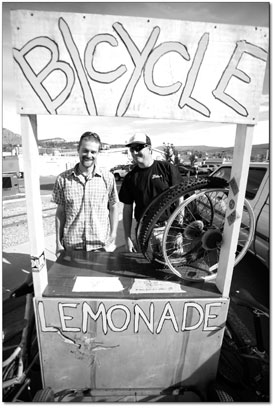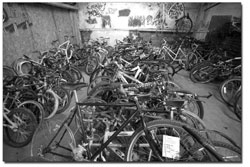|
| ||||||
| Bicycle Lemonade
by Will Sands The recipe goes something like this – Take an abandoned, lemon-colored Murray mountain bike; squeeze off the aging parts, dead tires and tacoed wheels; stir together the frame with parts salvaged from similar bikes; and pour the finished product back onto the streets of Durango. “We squeeze bicycles from lemons,” says Russell Zimmerman, one of the founders of . The new project is working to get disadvantaged bikes up, running and pedaling back around town and is the latest offshoot of deep Durango roots. For 33 years, Melvin T. Smylie sold all shapes, sizes and vintages of bicycle from the front yard of his North Main Avenue home. Mr. Smylie made his name by taking hard luck bikes, rehabilitating them and selling to Durangoans and passers-by for a handful of bucks. When the 94-year-old Mr. Smylie passed away in 2006, Zimmerman, Jon Bailey and Bob Gregorio, all of the Durango Cyclery, inherited the two-wheel treasure trove. As the new owners of hundreds of bikes and dozens of boxes and buckets laden with parts, the three started the Mr. Smylie Bike Project. In the ensuing months, the project gave away 120 bikes to Durangoans and chalked up relatively mixed results. “Mr. Smylie taught us a few things,” Zimmerman said. “One was that giving away bicycles doesn’t create a perception of value. After giving some people three or four bikes and seeing those bikes show up in pawn shops, we decided on a different approach.” The new approach entails rehabilitating donated and found bikes and selling them at near giveaway prices – $15 for a kid’s bike and $35 and up for an adult rig. The proceeds from sales are then funneled back into the program and future builds. Interestingly, Bicycle Lemonade found its identity only recently at the Four Corners Green Living Expo in late April. “We were asked to make an appearance at the expo,” Zimmerman said. “They put us on the spot and asked us to identify what we are. I realized that the closest thing is a lemonade stand. Kids build a stand, squeeze lemons into lemonade, make some money and then go out and buy more lemons.” Just like the lemonade stand, Bicycle Lemonade is working to refresh the community, but with human-powered transportation, according to Kristofer Pleszewicz, a partner in the effort. “We have bikes donated in various states of disrepair,” he said. “We scavenge parts off the duds and build up the nearly functional ones into working bicycles. The goal is to keep bikes out of landfills and get them back on the streets.” Durango businessman Phil Bryson got Bicycle Lemonade off the ground by donating use of warehouse space off Narrow Gauge Avenue. Ron Andrews, of King Cage, offered another boost by building the Bicycle Lemonade trailer. The contraption tows behind a bike and carries as many as six more before flips up into lemonade stand for sales. And Jon Bailey, Heather Shook and Scott Shisham have all helped get the lemons running and back into circulation. Bicycle Lemonade broke the ice at the Green Living Expo and found homes for 30 orphaned bicycles. The trailer has become a fixture at he Durango Farmers Market, made an appearance at last weekend’s Dandelion Festival and will be popping up throughout Iron Horse Weekend. After only a few weeks, the effort has alreadybee hihgly successful. “There’s a guy who rides a bike he bought from us for $40 to and from Rafter J every day,” Pleszewicz said. “We also sold a bike to a woman from France, who is here putting her kid through college but doesn’t have a driver’s license.”
Bicycle Lemonade has also gone beyond meeting basic transportation needs. “This is also for someone who realizes that they don’t have to spend $400 for a townie even though they may own a $5,000 mountain bike,” Zimmerman said. Plus, more than few hidden gems have found their way into the Narrow Gauge warehouse. A few vintage Yetis, a higher-end Trek road bike or two and several Peugot frames are all awaiting rehabilitation. But just like nearly every lemonade stand, Bicycle Lemonade is planned as a temporary venture. The plan, according to Zimmerman and Pleszewicz, is to use the project as a stepping stone to a full-fledged community bicycle cooperative. “The goal has always been the formation of a community bicycle co-op,” Pleszewicz said. “By that, we mean a place where people can rent space to work on bikes, donate time to help the co-op, take classes and recycle bike parts.” Raising capital through Bicycle Lemonade is a first step toward the co-op, and the creation of a registered nonprofit will be the next. The final goal is to create a community cycling center with a variety of offerings including: • Donated bicycle drop-off • Used bicycle parts for sale • Repair classes including specific clinics for women and kids • Public access tools and workstands • Mechanical and technical advice • Bicycle advocacy work And in the end, the success of the Smylie Bike Project, Bicycle Lemonade and the Durango Bike Co-op will be measured two wheels at a time. “We’re just trying to get more people on bikes more often,” Pleszewicz said. “It all seems pretty simple to us.” Bicycle Lemonade is actively seeking donations. Bikes, frames, parts, etc. can be dropped off at the Durango Cyclery, 143 E. 13th St.
|
In this week's issue...
- December 18, 2025
- Let it snow
Although ski areas across the West have taken a hit, there’s still hope
- December 18, 2025
- Look, but don't take
Lessons in pottery theft – and remorse – from SW Colorado
- December 11, 2025
- Big plans
Whole Foods, 270 apartments could be coming to Durango Mall parcel




